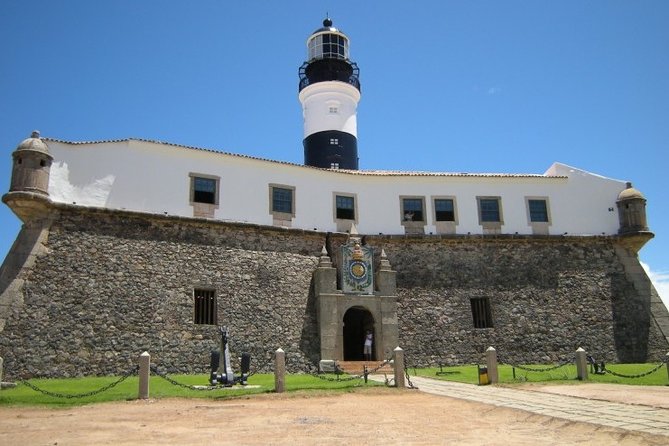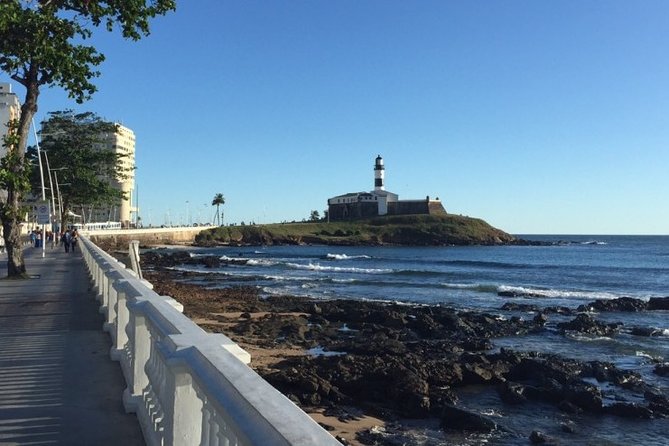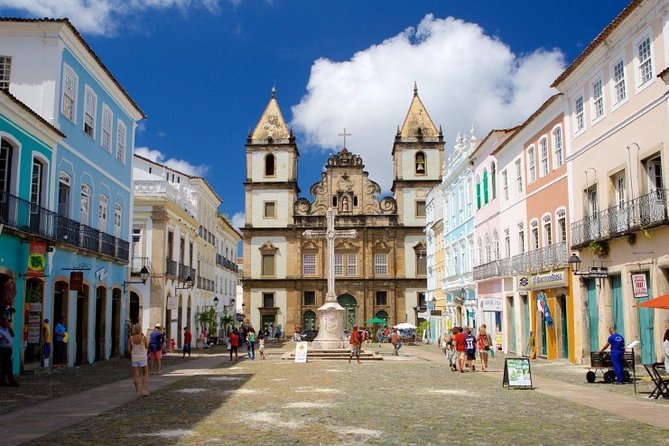Stepping into Historical Bahia is like opening the pages of a forgotten chapter in Brazil‘s vibrant past. This alluring region, nestled along the country’s northeastern coast, holds a treasure trove of historical significance waiting to be unveiled.
From its cobblestone streets that whisper tales of colonial conquests to its Afro-Brazilian heritage that echoes through the rhythm of the drums, Bahia offers a glimpse into a bygone era that continues to shape its present.
As the sun casts its golden glow upon the colorful facades of its historical landmarks, one can’t help but feel a sense of curiosity and anticipation, eager to unearth the stories that lie beneath the surface.
About Our Review: Please note that this is our review of this tour and we do not run, sell, or book tours from this site. If you want to book this tour please click the large button at the base of this page to go to the official listing on Viator.
Good To Know

Image Credit: Viator.com
- Bahia offers a seamless and convenient transportation experience with air-conditioned vehicles and knowledgeable tour guides.
- The historical landmarks in Bahia, such as Pelourinho and Elevador Lacerda, provide a glimpse into the rich colonial history and architecture of the region.
- Bahia’s cultural heritage is a unique blend of Afro-Brazilian dialect, Portuguese colonial architecture, and African-inspired designs, showcasing its diverse past.
- The traditional cuisine of Bahia combines African and Indigenous influences, using regional ingredients and cooking techniques to create bold and spicy flavors.
It's also worth checking out some other tours and experiences nearby.
Arrival in Bahia

Image Credit: Viator.com
Upon arriving in Bahia, travelers can expect a seamless and convenient experience with an air-conditioned vehicle provided for transportation and a knowledgeable tour guide to accompany them throughout their journey.
The arrival logistics are well-organized, ensuring that visitors are picked up from their designated pickup points. The transfer time is defined by the neighborhood or region of stay, allowing for efficient transportation to popular attractions.
It’s important to note that visitation fees for certain attractions, such as the Church, Farol da Barra, and Casa de Jorge Amado, aren’t included in the tour package. However, the overall experience is made effortless and enjoyable with the assistance of the tour guide, who provides valuable insights and information about the historical significance of each attraction.
From the moment of arrival, travelers can enjoy the rich cultural heritage of Bahia.
Historical Landmarks

Image Credit: Viator.com
With the seamless arrival experience and knowledgeable tour guide in tow, travelers can now explore the historical landmarks of Bahia and explore its rich cultural heritage. Here are four noteworthy sites that showcase Bahia’s colonial architecture and pay tribute to famous historical figures in the region:
-
Pelourinho: This UNESCO World Heritage site is a colorful neighborhood in Salvador that boasts beautifully preserved colonial buildings. Visitors can wander through cobblestone streets lined with grand mansions and churches, including the iconic São Francisco Church and Convent.
-
Elevador Lacerda: Built in 1873, this historic elevator connects the upper and lower parts of Salvador. It offers panoramic views of the city and the picturesque All Saints Bay. It’s a symbol of Bahia’s progress and modernization.
-
Forte de Santo Antonio da Barra: This 16th-century fort is the oldest military construction in Brazil. It played a crucial role in defending the city and now houses the Nautical Museum of Bahia, where visitors can learn about maritime history and admire the stunning views from the fort’s walls.
-
Casa de Jorge Amado: This museum was once the home of Jorge Amado, one of Bahia’s most famous writers. It showcases his personal belongings, photographs, and manuscripts, giving visitors a glimpse into the life and works of this literary icon.
Cultural Heritage
What cultural treasures await visitors in Bahia, Brazil?
Bahia is a region rich in cultural heritage, offering visitors a glimpse into its vibrant history and traditions. One of the notable aspects of Bahia’s cultural heritage is its language preservation. The region is known for its distinct Afro-Brazilian dialect, influenced by the African slaves who were brought to Bahia centuries ago. This unique blend of Portuguese and African languages has been preserved and is still spoken by many locals today, adding to the richness of the cultural experience in Bahia.
Another aspect of Bahia’s cultural heritage is its architectural influences. The region showcases a blend of Portuguese colonial architecture and African-inspired designs, creating a visually stunning landscape that tells the story of its past. From colorful colonial buildings to ornate churches, Bahia’s architectural heritage is a testament to its diverse cultural influences.
Visitors to Bahia can explore these cultural treasures and gain a deeper understanding of the region’s history and identity.
Traditional Cuisine
The traditional cuisine of Bahia, Brazil, tantalizes the taste buds with its vibrant flavors and unique culinary heritage. Here are four key aspects of Bahian cuisine that make it a true gastronomic delight:
-
Fusion of African and Indigenous Influences: Bahian cuisine is a result of the fusion between African and indigenous flavors. This combination creates a rich and diverse culinary experience.
-
Use of Regional Ingredients: Bahia is blessed with an abundance of regional ingredients such as dendê oil, coconut milk, and seafood. These ingredients add depth and complexity to the dishes.
-
Cooking Techniques: The cooking techniques used in Bahian cuisine are a reflection of its diverse cultural influences. One prominent technique is the use of clay pots for slow-cooking, which enhances the flavors and textures of the dishes.
-
Spices and Seasonings: Bahian cuisine is known for its bold and spicy flavors. The use of spices like pepper, ginger, and coriander, along with traditional seasonings like palm oil and coconut, create a unique and unforgettable taste experience.
Local Festivals
In the vibrant realm of Bahian culture, the flavors of traditional cuisine intertwine with the spirited celebrations of local festivals. These festivals serve as a reflection of the rich history and diverse traditions of Bahia.
One of the highlights of these festivals is the traditional music that fills the streets, captivating both locals and visitors alike. From the rhythmic beats of samba to the soulful melodies of bossa nova, the music creates an atmosphere of joy and excitement.
Religious rituals also play a significant role in these festivals, honoring the deep-rooted beliefs of the Bahian people. Whether it’s the lavishly decorated processions or the mesmerizing dances, these rituals showcase the spiritual essence of the region.
Attending a local festival in Bahia isn’t only a chance to experience the vibrant culture but also an opportunity to take in the captivating traditions of this enchanting land.
Here's a few more nearby tours and experiences we think you'll like.
- Transfer Between Salvador Airport and Costa Do Sauipe
- Tour Praia Do Forte and Guarajuba, Leaving Salvador-Bahia.
- Transfer Iberostar Bahia / Praia Do Forte – Private
- Transfer Salvador Airport / Hotel in Salvador
- Tourism and Transfer Salvador and Morro De São Paulo
- Transfer From the Airport to Iberostar Praia Do Forte or Bahia for up to 4 Pax
Common Questions
What Is the Best Time to Visit Bahia?
The best time to visit Bahia is during the months of November to March. These months offer pleasant weather conditions with warm temperatures and less rainfall, making it ideal for exploring the historical sites and enjoying outdoor activities.
Are There Any Special Events or Festivals Happening During My Visit?
During your visit, there may be special events or festivals happening in Bahia. Keep an eye out for folklore events and cultural celebrations that showcase the vibrant traditions and rich heritage of this historical region.
Can I Visit the Historical Landmarks on My Own or Do I Need a Tour Guide?
Visiting historical landmarks independently can be done, but hiring a tour guide has its benefits. A guide can provide valuable insights, historical context, and local knowledge that enhance the experience and ensure you don’t miss any important details.
What Are Some Must-Try Dishes of Bahian Traditional Cuisine?
Traditional Bahian dishes include acarajé, a deep-fried ball of black-eyed pea dough filled with shrimp, vatapá, a rich and creamy sauce made with bread, coconut milk, and nuts, and moqueca, a hearty fish stew. Popular street foods include tapioca pancakes and cocada, a sweet coconut treat.
Are There Any Specific Customs or Traditions That I Should Be Aware of When Visiting Bahia?
When visiting Bahia, it’s important to be aware of the cultural etiquette and traditions. Bahians value respect and hospitality, so it’s polite to greet people with a handshake or a hug. Traditional clothing, such as Bahian dresses and turbans, are often worn during festivals and celebrations.
Not for you? Here's more of our most recent tour reviews happening neaby
- Sand Dunes of Mangue Seco PRIVATE Full Day Tour From Salvador
- Salvador City Tour From Praia Do Forte Privat SUV Daytour
- Private Stand Up Paddle and Kayak Tour on the Imbassaí River
- Panoramic Historic Tour
- Ivan Bahias TOP Cachoeira & Recôncavo Cultural Heritage Day-Tour From Salvador
- Ivan Bahia, Chapada Diamantina National Park in 2 Days, Organized From Salvador
- Ivan Bahia, All Saints Bay: Cachoeira & Coconut Trees Including a Mangrove Tour and Lunch
- Discovery of the Lower City, Salvador Authentic, With LUNCH
- Luxury Private Excl. Salvador SUV City Tour With Lunch (Max 4 P.)
- Ultimate Culinary Adventure Awaits
- Historic Pelourinho Walking Tour Unveiled
- Uncover the Beauty of Coconut Coast Tour
- Exclusive Transfer Service With Top Reviews
- Rave Reviews for Salvador Panoramic Tour
- Bahia Beach Adventure: Praia Do Forte Tour
The Sum Up
To sum it up, a visit to Historical Bahia is a journey into the vibrant past of this captivating region.
With its rich history, iconic landmarks, cultural heritage, and delicious cuisine, Bahia offers a truly immersive experience.
Whether exploring the colonial architecture or indulging in the local festivals, travelers will be enchanted by the stories and traditions that have shaped this remarkable destination.
So pack your bags, hop on an air-conditioned vehicle, and let Bahia’s history come alive before your eyes.
